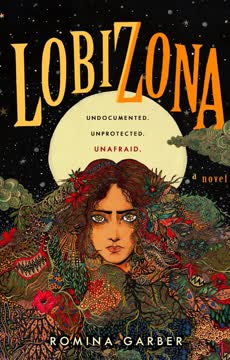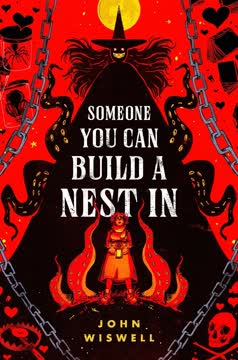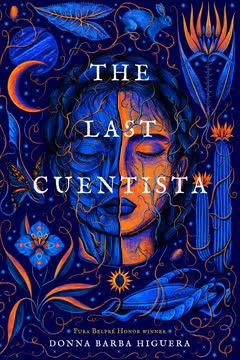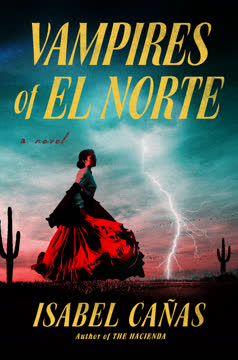Plot Summary
Moonlit Fear and Flight
Manuela "Manu" Azul's life in Miami is defined by fear and hiding. She and her mother, Soledad, are undocumented immigrants from Argentina, living under the constant threat of deportation. The story opens with a terrifying ICE raid in their apartment building, forcing Manu and her mother to hide under a bed, paralyzed by the knowledge that discovery means exile or worse. This fear is not just external; it's woven into Manu's body, as she suffers from a mysterious, excruciating condition every full moon—her so-called "lunaritis." The moon, for Manu, is both a curse and a secret promise of something more. The chapter sets the tone of anxiety, displacement, and the longing for safety, while hinting at the supernatural forces at play beneath the surface of Manu's ordinary, marginalized life.
Hidden in Plain Sight
Manu's daily existence is a careful choreography of invisibility. She wears mirrored sunglasses to hide her strange, golden, star-pupiled eyes, and avoids making friends or drawing attention. Her mother works as a maid and secretly as a nurse in an underground clinic, while Manu is homeschooled by Perla, their elderly Argentine neighbor. The apartment is filled with rituals and superstitions, blending Argentine culture with the constant threat of American bureaucracy. Manu's only solace is in books and the rooftop, where she dreams of the stars and watches a girl across the street who seems to live the life she can't have. The chapter explores the pain of isolation, the yearning for belonging, and the small acts of rebellion that keep hope alive.
The Curse of Seven
A breakfast conversation reveals the Argentine legend that the seventh son becomes a werewolf (lobizón), and the seventh daughter a witch. This superstition is so powerful it became law: the president of Argentina is godparent to every seventh child. Perla's stories, once comforting, now seem ominous as Manu's body changes with each full moon—sharper senses, painful transformations, and dreams of a magical citadel. The myth of the lobizón becomes a metaphor for Manu's otherness, her fear of discovery, and the possibility that her difference is not a curse, but a key to another world. The chapter weaves together folklore, family secrets, and the tension between myth and reality.
Eyes Like Suns
Manu's eyes are her most visible secret—golden irises with silver, star-shaped pupils. Her mother claims they are a genetic mutation from her father, a man Manu knows only through stories and a single, forbidden photograph. The eyes are both a source of shame and a mark of destiny, connecting Manu to a lineage of magic and danger. The chapter delves into the psychological toll of hiding, the longing to be seen, and the complicated inheritance of family trauma. Manu's relationship with her mother is loving but fraught with secrets, and her sense of self is fractured by the need to be invisible.
Dreams of Another World
Every full moon, sedated by blue pills, Manu dreams of a misty, magical world—Lunaris—filled with weeping trees, sentient shadows, and a forbidden citadel. These dreams are more vivid than reality, and each month, her body changes further. The dreams are both an escape and a prophecy, hinting that Manu's true nature is tied to this other realm. The chapter explores the porous boundary between dream and waking, the allure of the unknown, and the sense that Manu is being called to a destiny she can neither refuse nor understand. The emotional arc is one of longing, confusion, and the first stirrings of hope.
ICE at the Door
When Perla is injured and ICE raids the underground clinic where Manu's mother works, Manu is forced to flee. The world she knows collapses—her mother is arrested, Perla is hospitalized, and Manu is left alone, hunted by both human and supernatural forces. The trauma of displacement is immediate and visceral, as Manu must navigate a city that is both home and hostile territory. The chapter is a turning point, propelling Manu from passive hiding to active flight, and setting her on a path toward the truth about her identity. The emotional tone is one of panic, loss, and the desperate need for agency.
Secrets and Survival
Manu discovers that her mother never filed for legal residency; their hope for citizenship was a lie meant to protect her from despair. The revelation is devastating, shattering Manu's trust and forcing her to confront the reality that she is truly stateless. In her anger and grief, she runs—first physically, then emotionally—breaking the rules that have kept her safe but small. The chapter explores the pain of betrayal, the hunger for truth, and the moment when survival demands transformation. Manu's journey becomes not just about hiding, but about finding out who she really is.
The Rooftop Stranger
On the rooftop, Manu encounters a mysterious Argentine girl and a man with a Z-shaped belt buckle—signs that the magical world of her dreams is bleeding into reality. When she follows the stranger, she is drawn into a hidden community in the Everglades, where the laws of magic and myth reign. The chapter is a threshold, marking Manu's passage from the mundane to the magical, from isolation to the possibility of belonging. The emotional arc is one of curiosity, fear, and the first taste of wonder.
Into the Everglades
Manu's flight leads her deep into the Everglades, where she discovers El Laberinto—a secret school for Septimus (werewolves and witches) from all over the world. Here, the rules are different: gender determines magic, and the legend of the lobizón is real. Manu must hide her true nature, pretending to be a witch while her body and dreams betray her. She meets Tiago, Saysa, Catalina, and others who will become her friends and allies. The chapter is about crossing borders—literal, magical, and psychological—and the terror and exhilaration of being seen for the first time.
The World of Lunaris
Inside El Laberinto, Manu is thrust into a world of magical training, rigid gender roles, and ancient laws. She learns that only seventh sons become werewolves, and seventh daughters become witches—there is no place for someone like her. The school is both sanctuary and prison, offering the promise of belonging but demanding conformity. Manu's friendships deepen, especially with Tiago and Saysa, but her secret is a ticking bomb. The chapter explores the tension between community and individuality, the allure of power, and the fear of exposure.
Witches, Wolves, and Walls
As Manu trains with the witches, she struggles to fake magic she doesn't have, relying on her friends to cover for her. Rivalries and alliances form, and the school's social dynamics mirror the larger world's prejudices. Manu's growing feelings for Tiago complicate her friendship with Catalina, while Saysa's idealism offers hope for change. The chapter is about the joys and dangers of intimacy, the pain of exclusion, and the slow, painful process of self-acceptance. The emotional arc is one of vulnerability, courage, and the first stirrings of rebellion.
The Law of the Pack
When Manu's true nature is revealed—she is a lobizona, a female werewolf, something that should not exist—she becomes both a miracle and a threat. The laws of the Septimus are clear: hybrids are illegal, and the penalty is death. Manu's friends must choose between loyalty and safety, and Manu herself must decide whether to hide, run, or fight. The chapter is a crucible, burning away illusions and forcing each character to confront their deepest fears and desires. The emotional tone is one of terror, defiance, and the fierce will to survive.
The Truth About Fierro
Manu learns that her father is Fierro, the legendary Septimus rebel who tried to change the system and disappeared. This revelation ties her to a history of resistance and marks her as a target for those who want to preserve the old order. The truth about her parentage is both a burden and a source of strength, connecting her to a lineage of outcasts and visionaries. The chapter explores the power of names, the pain of inheritance, and the possibility that the past can be rewritten. The emotional arc is one of grief, pride, and the dawning of purpose.
Magic, Identity, and Exile
With her secret out, Manu must forge a new identity—literally, with a forged Huella (magical ID)—and decide whether to claim her place in the Septimus world or run. Her friends risk everything to help her, breaking laws and defying their families. The chapter is about the price of belonging, the courage to claim one's truth, and the realization that freedom is never free. Manu's journey becomes a quest not just for survival, but for justice and self-determination. The emotional tone is one of solidarity, sacrifice, and the bittersweet taste of hope.
The Price of Belonging
As the championship game approaches, Manu must choose between playing and exposing herself to the world, or staying hidden and safe. Her relationships with Tiago, Saysa, and Catalina are tested by secrets, jealousy, and the demands of the pack. The chapter explores the tension between personal desire and collective responsibility, the pain of loving in a world that forbids it, and the realization that true belonging requires risk. The emotional arc is one of heartbreak, courage, and the willingness to lose everything for a chance at something more.
The Game and the Girl
Manu's performance on the field is both a triumph and a danger—her abilities are undeniable, but her existence is an affront to the laws of magic. The world is watching, and the price of visibility is high. When she is betrayed and hunted, Manu must rely on her friends, her wits, and her newfound powers to survive. The chapter is a climax of action, emotion, and revelation, as Manu claims her place in the world and refuses to be erased. The emotional tone is one of exhilaration, terror, and the fierce joy of self-assertion.
The Power of Names
In the aftermath of the game, Manu confronts the full weight of her heritage and the meaning of her name. She is not just a lobizona or a hybrid—she is a new kind of being, one who refuses to be defined by the categories of the past. With the help of her friends and her father, she forges a new path, leaving her mark on Lunaris and vowing to fight for a world where everyone belongs. The chapter is about the power of self-naming, the courage to claim one's story, and the hope that change is possible. The emotional arc is one of resolution, empowerment, and the promise of a new beginning.
Betrayal and Bloodlines
As Manu's true parentage is revealed, alliances shift and old wounds are reopened. Jazmín's betrayal, Gael's confession, and the tangled web of loyalty and ambition threaten to tear the group apart. Manu must navigate the dangerous politics of the Septimus world, balancing her desire for justice with the need to protect those she loves. The chapter explores the pain of betrayal, the complexity of family, and the realization that the personal is always political. The emotional tone is one of anger, sorrow, and the hard-won wisdom of experience.
The Choice to Run
With the law closing in, Manu and her friends must choose between surrender and flight. The decision to run is both an act of desperation and a declaration of independence—a refusal to accept a world that has no place for them. The chapter is about the courage to defy authority, the pain of leaving home, and the hope that comes from forging a new path. Manu's journey becomes a collective one, as her friends join her in exile, vowing to build a world where difference is not a crime. The emotional arc is one of grief, solidarity, and the fierce determination to survive.
A New Mark on the Moon
As Manu escapes through the portal to Argentina, she leaves her mark on the moon—a symbol of hope, resistance, and the possibility of change. The story ends with the promise that she will return, not as a fugitive, but as a force for transformation. The chapter is about the power of symbols, the importance of memory, and the belief that even the most marginalized can shape the future. The emotional tone is one of bittersweet triumph, resolve, and the quiet joy of knowing that the story is not over.
Characters
Manuela "Manu" Azul
Manu is a seventeen-year-old Argentine immigrant living in Miami, defined by her golden, star-pupiled eyes and her monthly, agonizing "lunaritis." Raised in hiding by her mother, Manu is intelligent, bookish, and deeply lonely, longing for connection but terrified of discovery. Her psychological journey is one from invisibility and self-loathing to self-acceptance and rebellion. Manu's relationships—with her mother, Perla, and her friends at El Laberinto—are fraught with secrets, love, and betrayal. As she discovers her true nature as a lobizona (female werewolf) and the daughter of the legendary rebel Fierro, Manu becomes a symbol of hope and danger, forced to choose between survival and justice. Her development is marked by courage, vulnerability, and the refusal to be defined by others' categories.
Soledad "Lily" Azul
Soledad is Manu's mother, a former nurse who fled Argentina to protect her unborn child from her father's dangerous family. She is fiercely loving but haunted by trauma, sacrificing everything for Manu's safety—even at the cost of truth. Her relationship with Manu is complex: nurturing yet controlling, honest yet riddled with lies. Soledad's psychological struggle is between hope and fear, trust and secrecy. Her love is both a shield and a cage, and her greatest flaw is her inability to let Manu choose her own path. Her development is a slow, painful letting go, as she learns to trust her daughter's strength.
Perla
Perla is the elderly Argentine neighbor who homeschools Manu and provides a link to her cultural roots. Blind and frail, Perla is nonetheless sharp-witted, sardonic, and deeply compassionate. She is haunted by her own past—having survived Argentina's Dirty War—and uses stories and superstitions to make sense of a world that is often cruel and irrational. Perla's relationship with Manu is one of mutual respect and affection, and her psychoanalytic insight helps Manu navigate her identity crisis. Perla represents the wisdom of survival, the power of memory, and the importance of dreaming even in exile.
Tiago
Tiago is a charismatic, talented lobizón at El Laberinto, admired for his athleticism and leadership but burdened by expectations. He is torn between loyalty to his family, his feelings for Manu, and the rigid laws of the Septimus world. Tiago's psychological struggle is with indecision, the fear of failure, and the longing to be seen for who he is rather than what he represents. His relationship with Manu is passionate, fraught with danger, and ultimately transformative for both. Tiago's development is a journey from passivity to agency, as he chooses love and rebellion over conformity.
Saysa
Saysa is a Jardinera (earth witch) and Tiago's sister, known for her optimism, empathy, and commitment to justice. She is Manu's first true friend at El Laberinto, helping her navigate the complexities of magic and identity. Saysa's psychological arc is one of idealism tested by reality—her belief in change is challenged by the dangers of rebellion and the pain of betrayal. Her relationship with Catalina is both romantic and political, representing the hope for a more inclusive world. Saysa's development is marked by courage, compassion, and the willingness to risk everything for what she believes is right.
Catalina "Cata"
Catalina is the privileged, perfectionist daughter of El Laberinto's headmistress, an Invocadora (air witch) who struggles with the weight of expectations and the fear of exposure. Her relationship with Manu is initially antagonistic, marked by rivalry and suspicion, but deepens into friendship and solidarity as they face common threats. Cata's psychological struggle is with vulnerability, the need for control, and the pain of loving in secret—her romance with Saysa is both a source of strength and a dangerous secret. Her development is a journey from isolation to connection, from compliance to defiance.
Gael / Fierro
Gael, known as Fierro, is Manu's father and the legendary Septimus who tried to change the system and disappeared. He is a figure of myth and longing, both a source of hope and a cautionary tale. Gael's psychological arc is one of guilt, loss, and the search for redemption. His relationship with Manu is fraught with absence and yearning, and his love for Soledad is both a blessing and a curse. Gael represents the possibility of change, the cost of rebellion, and the pain of being unable to protect those he loves. His development is a slow, painful reckoning with the consequences of his choices.
Jazmín
Jazmín is Catalina's mother and the headmistress of El Laberinto, a powerful witch who embodies the rigidity and fear of the old order. She is both protector and oppressor, driven by the need to control and the fear of chaos. Jazmín's psychological struggle is with loss—of status, family, and certainty—and her actions are motivated by a desperate need to restore order. Her relationship with Catalina is fraught with love, disappointment, and the inability to accept difference. Jazmín's development is a tragic arc, as her attempts to save her family only drive them further away.
Yamila
Yamila is a young, ruthless fire witch and Cazadora (hunter) determined to make her mark by capturing Manu. She is both a mirror and a foil to Manu—ambitious, talented, and willing to break rules for her own advancement. Yamila's psychological arc is one of envy, insecurity, and the hunger for recognition. Her relationship to the other characters is adversarial, but her actions are driven by the same longing for belonging and validation that haunts Manu. Yamila represents the dangers of internalized oppression and the cost of seeking power within a broken system.
Carlos
Carlos is a lobizón who resents Manu's presence and challenges her at every turn. He embodies the rigid gender roles and toxic masculinity of the Septimus world, using strength and tradition to justify exclusion and violence. Carlos's psychological struggle is with insecurity, the fear of losing status, and the inability to adapt to change. His relationship with Manu is antagonistic, but his actions force her to confront the limits of the system and the need for revolution. Carlos represents the obstacles to progress and the pain of those left behind by history.
Plot Devices
Dual Worlds and Magical Realism
The novel uses the device of dual worlds—Miami and Lunaris—to mirror Manu's dual identity as both human and Septimus, immigrant and native, girl and wolf. Magical realism infuses the narrative, with dreams, superstitions, and folklore bleeding into reality. The boundary between worlds is porous, reflecting the psychological experience of exile and the longing for home. The magical school, El Laberinto, serves as both sanctuary and prison, a place where the rules of magic mirror the prejudices of the real world. The device allows for the exploration of complex themes—immigration, gender, belonging—through the lens of fantasy.
The Curse of Seven and Gendered Magic
The legend that only seventh sons become werewolves and seventh daughters become witches is both a plot device and a metaphor for the rigid gender roles and exclusionary laws of the Septimus world. Manu's existence as a lobizona—a female werewolf—is an impossibility that threatens the system. The curse of seven is used to explore the pain of being "illegal," the violence of categorization, and the possibility of rewriting destiny. The device is both literal (shaping the rules of magic) and symbolic (critiquing patriarchy and binary thinking).
Hidden Identity and the Forged Huella
Manu's need to hide her true nature drives much of the plot, as she forges a magical ID (Huella) and relies on her friends to cover for her. The device of the hidden identity creates tension, suspense, and the constant threat of exposure. It also allows for the exploration of trust, betrayal, and the psychological toll of living a lie. The forged Huella is both a literal tool for survival and a symbol of the ways marginalized people must navigate hostile systems.
The Game as Crucible
The Septibol championship serves as a crucible for Manu's transformation, forcing her to choose between safety and self-assertion. The game is both a literal contest and a metaphor for the struggle to be seen, to belong, and to change the rules. The device allows for the exploration of teamwork, rivalry, and the cost of standing out. The climax of the game is also the climax of Manu's journey—from invisibility to visibility, from survival to resistance.
Foreshadowing and Symbolism
The novel is rich in foreshadowing—Manu's dreams of Lunaris, the recurring symbol of the Z (and later, her own M), and the stories told by Perla and others all hint at the revelations to come. The use of marks—on the moon, on the body, in the Huella—serves as a device for exploring the power of naming, the pain of erasure, and the hope of leaving a legacy. The rewriting of stories—both personal and collective—is a central device, allowing Manu to claim agency and imagine a new future.
Analysis
**Lobizona is a powerful, genre-blending novel that uses the tropes of fantasy and magical realism to interrogate the real-world experiences of immigration, exile, and the search for belonging. At its core, the book is about the pain and possibility of being "illegal"—not just in the eyes of the law, but in the eyes of society, family, and even oneself. Romina Garber weaves together Argentine folklore, contemporary politics, and the universal coming-of-age journey to create a story that is both deeply personal and broadly resonant. The novel critiques the violence of borders—literal and metaphorical—and the ways in which systems police bodies, identities, and dreams. Through Manu's journey from invisibility to self-assertion, the book argues that true belonging is not about fitting into existing categories, but about rewriting the rules and claiming one's own story. The friendships, romances, and betrayals that shape Manu's path are rendered with psychological depth and emotional honesty, making her struggle both specific and universal. Lobizona ultimately offers a vision of hope: that even those most marginalized can become the authors of their own destinies, leaving marks on the world that promise change for those who come after.
Last updated:
Review Summary
Lobizona received mostly positive reviews, with readers praising its unique blend of Argentinian folklore, magical realism, and contemporary themes. Many appreciated the exploration of immigration issues and the protagonist Manu's journey of self-discovery. The world-building and diverse characters were highlights for most reviewers. Some criticized pacing issues and predictable plot elements. Overall, readers found it to be an engaging and important YA fantasy that tackles relevant social topics while providing an immersive magical experience.
Wolves of No World Series Series
Download PDF
Download EPUB
.epub digital book format is ideal for reading ebooks on phones, tablets, and e-readers.








